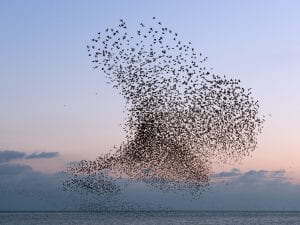Summary
Members of the Centre for Arts and Wellbeing have been exploring and enhancing wellbeing through the arts and culture in their research, creative practice and knowledge exchange work, putting the Centre at the forefront of work in this area.
Impactful Practice, Research and Knowledge Exchange at The Centre for Arts and Wellbeing
Helen Johnson
As James Purnell, Vice-chancellor for the University of the Arts London, notes in a recent letter to The Guardian, “the personal and civic benefits of the arts are enormous. Equally remarkable is the economic impact of the UK’s creative industries, which have grown at 1.5 times the rate of the wider economy for the past decade, generating more wealth than aerospace, the life sciences and automotive sectors combined” (Purnell, Mundae and Thompson, 2024).
The role of the arts and creativity in maintaining and supporting wellbeing is, quite rightly, something of a hot topic. While this relationship has long been recognised by scholars and rehearsed in everyday practice, it came to greater prominence in the U.K. during the COVID lockdowns, when many people turned to the arts as a means to cope, heal, learn, entertain, and connect with others (see e.g. Johnson, 2020). Recent meta-analyses and syntheses of literature have identified a wide range of wellbeing impacts from arts and culture participation across the lifespan, with benefits ranging from: increasing self-esteem (e.g. Fancourt et al, 2023); fostering empathy and an appreciation of diversity (e.g. Crossick and Kaszynska, 2016); and supporting emotional regulation (e.g. Fancourt et al, 2023); to enhancing social capital, social relationships and connectivity (e.g. APPGAHW, 2017; Crossick and Kaszynska, 2016; Fancourt et al, 2023; Wright, 2022);. Indeed, Fancourt et al (2021) identify some 600 mechanisms through which the arts could impact health and wellbeing.
Members of the University of Brighton’s Centre for Arts and Wellbeing are at the forefront of this work, developing research, creative practice and knowledge exchange that explores, promotes and enhances the relationship between the arts and wellbeing at individual and collective levels. Recent and ongoing projects include: the impact of nature-based interventions and human/non-human animal relations to support diversity, build resilience and enrich wellbeing (Nick Gant; Matthew Adams); using trans-sensory storying to address gender-based violence (Lesley Murray and Jessica Moriarty); exploring cultural democratisation through the lens of Norwegian hip hop (Kai Arne Hansen, Shara Rambarran et al); and developing an international research network for everyday creativity (Helen Johnson).
We work closely with partners in the cultural sector, community organisations and charities, and local and national government, as well as with other higher education institutions around the world. Our members played an active role in helping East Sussex County Council (ESCC) to develop their Creating Healthier Lives Strategy (2023), for example, and were instrumental in establishing a new, formal partnership with ESCC to explore the determinants of health, with a view to supporting health and addressing health inequalities in the local area.
We hold frequent events to showcase our work, kickstart new projects and further develop our network. Forthcoming events include an international conference on everyday creativity, a Festival for the Summer Solstice, celebrating the work of our post-graduate researchers, and a symposium exploring human-animal and multi-species relations.
Within, and beyond these events, we are always keen to make new connections within and beyond the University of Brighton. If you are a Centre member who wants to share your research, practice and/or knowledge exchange work, or if you are interested in becoming a member, do get in touch with us at: centreforartsandwellbeing@brighton.ac.uk
References
All-Party Parliamentary Group on Arts, Health and Wellbeing (APPGAHW) (2017). Creative Health: The Arts for Health and Wellbeing. (2nd ed.) https://www.culturehealthandwellbeing.org.uk/appg-inquiry/Publications/Creative_Health_Inquiry_Report_2017_-_Second_Edition.pdf
Crossick, G. and Kaszynska, P. (2016). Understanding the Value of Arts & Culture. The AHRC Cultural Value Project. Arts and Humanities Research Council. https://www.ukri.org/wp-content/uploads/2021/11/AHRC-291121-UnderstandingTheValueOfArts-CulturalValueProjectReport.pdf
Fancourt, D., Aughterson, H., Finn, S., Wlaker, E. and Steptoe, A. (2021). How Leisure Activities Affect Health: A Narrative Review and Multi-level Theoretical Framework of Mechanisms of Action. Lancet Psychiatry, 8: 329-39.
Fancourt, D., Bone, J.K., Bu, F., Mak, H.W., and Bradbury, A. (2023). The Impact of Arts and Cultural Engagement on Population Health: Findings from Major Cohort Studies in the UK and USA 2017 – 2022. London: UCL. 2023 March.
Johnson, H. (2020). Arts and Culture in a ‘New Normal.’ The Psychologist, 33 (July): 98-99. https://www.bps.org.uk/psychologist/arts-and-culture-new-normal.
Purnell, J., Mundae, G. and Thompson, D. (2024). Rejuvenating and Protecting the Arts Requires Creative Thinking. The Guardian. March 25, 2004. https://www.theguardian.com/culture/2024/mar/25/rejuvenating-and-protecting-the-arts-requires-creative-thinking
Wright, J. (2022). Research Digest. Everyday Creativity. Version 1. Leeds: Centre for Cultural Value. https://www.culturehive.co.uk/wp-content/uploads/2022/07/Research-digest-Everyday-creativity-FINAL.pdf




